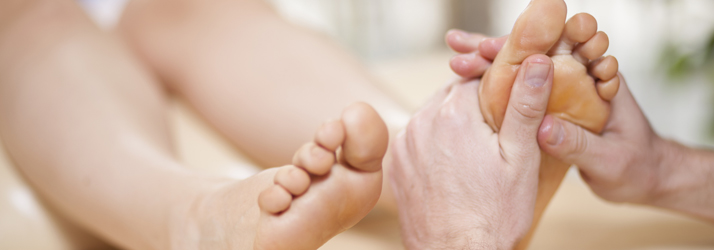NEUROPATHY SIGNS AND SYMPTOMS IN Louisville KY

Do you have signs and symptoms of neuropathy in Louisville KY? Neuropathy is also known as peripheral neuropathy because of its effect on the body's sensory and motor nerves. It is very common for patients to experience the first symptoms in their extremities (hands, arms, legs and feet). When this occurs it is referred to as Sensorimotor Polyneuropathy.
Signs and Symptoms of Neuropathy in Louisville KY
- Experiencing tingling sensations in the extremities. This sensation is also described as a pin and needling feeling or prickling feeling.
- Burning pain in the lower limbs. Eventually the burning will move into the arms and hands as the condition progresses.
- Having pains that are sharp and stabbing. Generally these pains are worse in the evening. As the burning sensation, it will begin in the feet and legs and as the condition processes, the "electric-like" pain will move into the hands and arms.
It is also common for patients to develop muscle weakness and coordination problems. The muscles in the limbs may also become paralyzed. Patients also have increased likelihood of developing foot ulcers and infections in the skin. Peripheral neuropathy can occur when there is nerve damage and develop into dysesthesia, which effects a patients' touch sensation. This often leads to a tingling and/or burning sensation. The skin on the extremities eventually will become so sensitive that the pressure from sheets or towels.
CAUSES OF NEUROPATHY
There is not a single underlying cause for neuropathy. In fact, there may be no known cause which is referred to as idiopathic and makes up nearly 40% of all neuropathies. Also, nearly 35% of the remaining Americans suffering from neuropathy have diabetes. In fact, almost 70% of Americans with diabetes have developed a form of neuropathy due to the disease. The remaining percent of neuropathies are composed of a group called acquired neuropathies. This group consists of causes such as:
- Alcoholism
- Poor nutrition and nutritional deficiencies
- Trauma
- Pressure on nerves
- Repetitive movements for extended periods of time
- Various autoimmune diseases
- Rheumatoid Arthritis
- Lupus
- Toxins
- Heavy metal poisoning
- Various medications
- Certain cancer treatments
- Hereditary neuropathies (from inherited disorders)
- Tumors
- Other diseases, including but not limited to:
- HIV/AIDS
- Lyme disease
- Liver disease
- Kidney disease
- Hypothyroidism
WHO CAN DEVELOP NEUROPATHY?
Neuropathy can affect all people of all ages in Louisville. It is more commonly found in men and Caucasians as well as those who have jobs consisting of a lot of repetitive movements. There are several risk factors ranging from lifestyle choices, behaviors, and conditions. As previously stated, those who have poor nutrition are likely to develop Type II Diabetes which will cause neuropathy. If a person suffers from an autoimmune disease, they have a predisposition for the development of various types of neuropathy. If a person has a compromised immune system (organ transplant recipient, HIV/AIDS patients, or due to medication), they are at an increased risk for developing a type of neuropathy. If a person suffers from alcoholism or has a vitamin deficiency, they are likely to develop a form of neuropathy. Also, if a person has kidney disease, liver disease or a thyroid disorder they are more susceptible to developing neuropathy.
DIAGNOSIS OF NEUROPATHY
This condition is generally not a simple diagnosis to make. It is difficult because it is not often that it is a disease present alone but rather a symptom of an underlying disease. There is a process that occurs before the diagnosis is made. The process may consist of:
- Full medical history
- Physical exam
- Neurological exam
- Tendon reflexes
- Muscular strength
- Muscular tone
- Sensory tests
- Postural analysis
- Coordination analysis
- Blood tests (check vitamin B-12)
- Urinalysis
- Thyroid function tests
- Nerve conduction test
- In some cases, a nerve biopsy may be requested by a physician.
TREATMENT OPTIONS
Treatment options have been limited. Photobiomodulation (Cold laser therapy) was approved by the FDA in 2003. This Therapy is used by professional sports teams, navy seals, veterinarians and in the rehabilitation centers. In recent years clinical trials have been performed on neuropathy patients. The results were measured by outcome assessment scales. Significant improvement was shown in pain and functionality.
Journal of Clinical Oncology https://ascopubs.org/doi/abs/10.1200/jco.2012.30.15_suppl.9019
At Westport Chiropractic and Rehab in Louisville, we use a class 2 (LLT) laser. Which uses a cluster light series that work in the spectrum of Red visible at 632nM and in infrared at 870nM (Wavelength). These frequencies cause a chemical reaction in the mitochondria of the cell causing the production of ATP amino-tri-phosphate AKA energy. This increased blood flow is what helps in the healing process.
PHYSIOLOGICAL EFFECTS OF PHOTOBIOMODULATION / COLD LASER THERAPY
- Increased ATP synthesis
- Increased cell motility
- Increase cell proliferation
- Increased growth factor response
- Increased angiogenesis
- Immune system response
- Reduced nociceptor activity
- Modulation of metabolism of neurochemicals
- Matrix remodeling enhanced
To see if you or someone you know would be a candidate for this type of treatment please contact our top Louisville chiropractor at Westport Chiropractic and Rehab to schedule a consultation at (502) 326-5000.
OFFICE HOURS
Monday
8:30am - 12:00pm
2:30pm - 6:00pm
Tuesday
8:30am - 12:00pm
2:30pm - 6:00pm
Wednesday
8:30am - 12:00pm
2:30pm - 6:00pm
Thursday
8:30am - 12:00pm
2:30pm - 6:00pm
Friday
Closed
Saturday & Sunday
Closed
Westport Chiropractic and Rehab
4169 Westport Rd #107
Louisville, KY 40207



